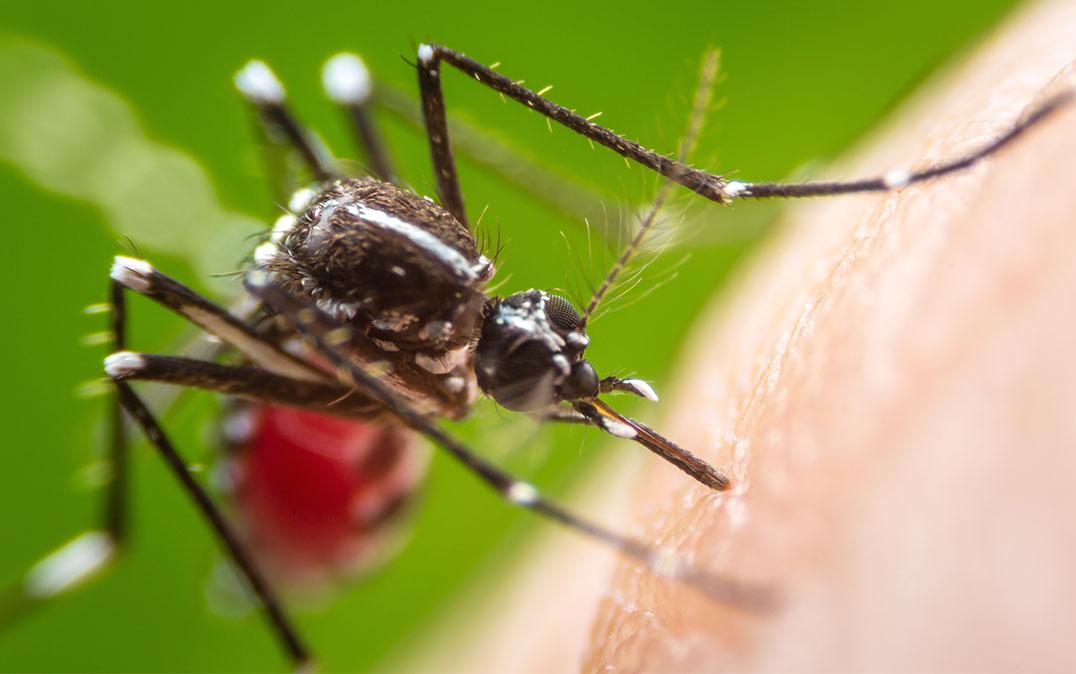Research News
All Abuzz: Larvicidal Flavonoids Inhibit Key Enzyme in Yellow Fever Mosquitoes
 Image by khlungcenter/Shutterstock
Image by khlungcenter/Shutterstock
Researchers from the University of Tsukuba find that flavonoids that show larvicidal action in Aedes aegypti mosquitoes inhibit the activity of Nobo, an enzyme used in the biosynthesis of the insect steroid hormone ecdysone
Tsukuba, Japan—When most people think of flavonoids, natural compounds found in plants and other organisms, their nutritional benefits probably come to mind first. But these compounds may have another health benefit: researchers from Japan have discovered that certain flavonoids inhibit development in mosquitoes that can spread disease.
In a study published this month in BMC Biology, researchers from the University of Tsukuba have revealed that particular flavonoids inhibit an enzyme involved in the formation of a key insect hormone in the yellow fever mosquito, Aedes aegypti.
Mosquito-borne diseases are a major component of the worldwide burden of infectious disease in humans. Aedes aegypti is from a group of mosquitoes that can spread a number of viruses that cause infectious diseases in humans, including dengue fever, yellow fever, and Zika. In the wild, A. aegypti has begun to show resistance to insecticides, revealing a need for new types of pesticides for targeting this species.
"Flavonoids—a type of metabolic product from plants, fungi, and other organisms—can interfere with insect development and physiology, and have the ability to kill larvae of A. aegypti," says senior author of the study, Professor Ryusuke Niwa. "Flavonoids are thought to be relatively safe for the environment, as well as human and animal health."
To investigate how flavonoids can kill mosquito larvae, the researchers analyzed the activities of several flavonoids in A. aegypti, including daidzein, which has previously been identified as a larvicide for this species. The team found that the flavonoids inhibit the activity of glutathione S-transferase Noppera-bo (Nobo); in A. aegypti, Nobo is an enzyme involved in the biosynthesis of the hormone ecdysone.
Ecdysone is an insect steroid hormone, or ecdysteroid, required for the initiation of metamorphosis and regulation of molting. Because ecdysteroids are key to the life cycle of insects, chemical inhibitors of enzymes involved in making these hormones, including Nobo, are thought to be insect growth regulators (IGRs) that disrupt development in insects without affecting other organisms.
"We also discovered that, of the flavonoids we tested, desmethylglycitein (DMG) was the most efficient Nobo inhibitor in this species, even more so than daidzein," says Professor Niwa. "DMG showed larvicidal activity against A. aegypti, and indicated promise for DMG-based insecticides in the future."
The high prevalence of resistance in mosquitoes to current insecticides in some areas urgently requires the development of new insecticides with different chemical structures and targeting pathways from those currently in use. The results of this study offer a new avenue for developing new IGRs that are environmentally friendly and can be used for the control of mosquito populations by inhibiting the biosynthesis of ecdysteroids.
###
This work was supported in part by a KEK Postgraduate Research Student fellowship to K.I.; by the Japan Society for the Promotion of Sciences (KAKENHI grant numbers 15K14719, 17H01472, and 18K19163 to R.N.), and by the Private University Research Branding Project. Additionally, this research was supported by the Platform Project for Supporting Drug Discovery and Life Science Research (Basis for Supporting Innovative Drug Discovery and Life Science Research (BINDS)) from AMED, under grant numbers JP21am0101071, JP21am0101086, 803 JP21am0101113, and JP21am0101114 (support numbers: 1290, 2111, 2145, and 2528, respectively). This work was carried out by the joint research program of the Institute for Molecular and Cellular Regulation, Gunma University.
Original Paper
The article, "Molecular action of larvicidal flavonoids on ecdysteroidogenic glutathione S-transferase Noppera-bo in Aedes aegypti," was published in BMC Biology at DOI: 10.1186/s12915-022-01233-2
Correspondence
Professor NIWA Ryusuke
Life Science Center for Survival Dynamics, Tsukuba Advanced Research Alliance (TARA), University of Tsukuba
Related Link
Life Science Center for Survival Dynamics, Tsukuba Advanced Research Alliance (TARA)






